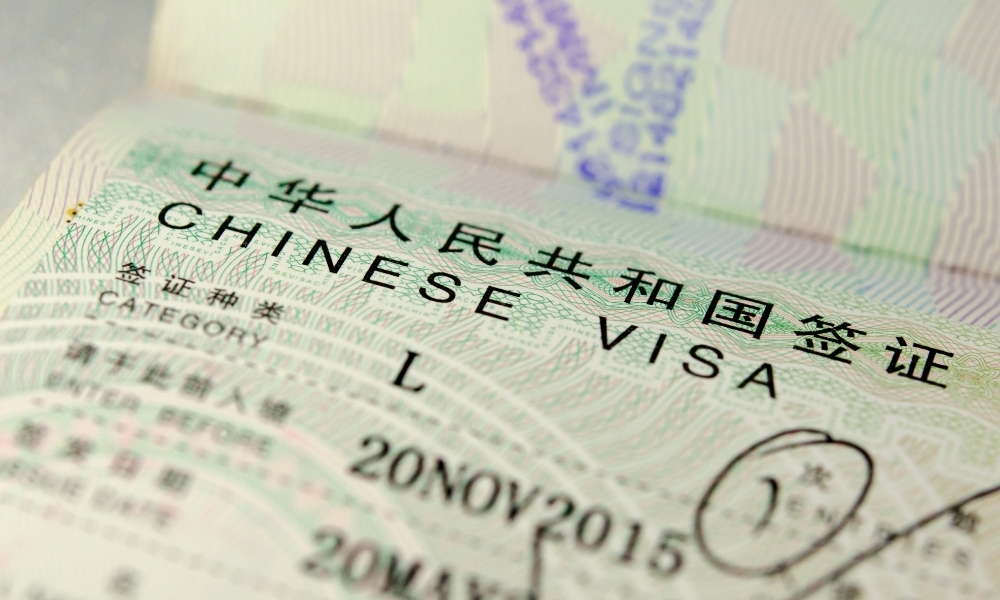China, a land of ancient traditions and futuristic cityscapes, is an increasingly intriguing destination for digital nomads. With its rich culture, incredible food, and rapidly developing infrastructure, it offers a unique experience for those who can work from anywhere. Navigating the visa landscape is the first step to your adventure. This guide Onward Free will provide a comprehensive overview of the China digital nomad visa requirements, helping you plan your journey to the Middle Kingdom.
Is There a Digital Nomad Visa for China in 2025?
Let’s get straight to the point: currently, there is no official “China Digital Nomad Visa”. Unlike some countries that have created specific programs to attract remote workers, China has not yet introduced a dedicated China Digital Nomad Visa category for this purpose. However, this doesn’t mean your dream of working remotely from a bustling cafe in Shanghai or a historic teahouse in Chengdu is impossible. Digital nomads can utilize other existing visa types to legally enter and stay in the country for a period.

Best Options for China Digital Nomad Visa
For most digital nomads, the goal is to enter China legally and work remotely, a path many take in the absence of an official China Digital Nomad Visa. The two most common and practical visa options for this scenario are the Tourist Visa (L) and the Business Visa (M).
L Visa (Tourist Visa)
The L Visa is the most popular choice for digital nomads. While on an L visa, working remotely for your foreign-based job falls into a gray area not explicitly covered by rules for a tourist visa or a potential China Digital Nomad Visa. The key is that your economic activity is not tied to the local Chinese market.
M Visa (Business Visa)
The M Visa is intended for individuals visiting for commercial and trade activities. This could be a good fit if you plan to attend trade fairs, visit factories, or meet with business partners in China. It may grant a longer stay than a tourist visa. To obtain an M visa, you usually need an invitation letter from a Chinese business or trade fair organizer.
General Requirements for Digital Nomads Entering China
Even without a specific China Digital Nomad Visa, you will need to prepare a standard set of documents. Being organized is crucial for a successful application.
Valid passport (6+ months)
Your passport must have a minimum of six months’ validity from your intended date of entry into China and feature at least two completely blank pages. This is a strict international travel requirement, and airlines will deny boarding if your passport doesn’t meet this standard. Double-check your passport’s expiration date well in advance of booking any travel.
Recent passport-size photos
Submit recently taken color photographs against a plain white background, adhering to the strict dimensions required by the Chinese embassy (typically 48mm x 33mm). Your face must be fully visible with a neutral expression, and you should not wear hats or glasses unless for religious or medical reasons. It’s best to have these taken by a professional service that is familiar with Chinese visa photo specifications.
Visa application form
The visa application must be filled out online through the official China Online Visa Application (COVA) website with complete accuracy. Any discrepancies or errors, even minor ones, can lead to delays or outright rejection of your application, so review every entry carefully. After completing it online, you must print the full form, including the confirmation page, and sign it where required.

Proof of accommodation (hotel or Airbnb booking)
You must submit confirmed accommodation bookings for at least the initial part of your trip, clearly showing your name and the property’s address. These reservations serve as proof of your intended itinerary within the country and help officials verify your plans. Ensure the confirmation documents are printed and included with your application materials.
Onward or return flight ticket (important for tourist visa)
Chinese authorities need to see proof that you intend to leave the country. A confirmed round-trip flight ticket is standard. For nomads who prefer flexibility, a service like OnwardFree.com is an excellent solution. It allows you to get a verifiable onward ticket for a fraction of the cost of a full-fare ticket, satisfying visa requirements without locking you into a fixed departure date. You can also get a free dummy ticket for other purposes.
Bank statement or financial proof
You’ll need to provide a recent bank statement, typically from the last 3-6 months, showing your name and a consistent, positive balance. While there’s no fixed minimum amount, a general guideline is to show at least $100 USD per day for your planned stay to demonstrate financial stability. The statement proves you can support yourself without resorting to illegal work in China.
Travel insurance
Comprehensive medical and travel insurance is a critical safeguard, covering potential emergencies, trip cancellations, or lost luggage. Look for a policy that explicitly provides coverage in the People’s Republic of China and includes a provision for medical evacuation. Having this insurance provides peace of mind and financial protection throughout your travels.
Can You Legally Work Remotely Without a China Digital Nomad Visa?
This is the million-dollar question for anyone considering a stay without a China Digital Nomad Visa. Officially, Chinese visa regulations do not explicitly permit foreign nationals to perform work-related activities on a tourist visa. However, the concept of “work” traditionally refers to employment by a local entity. Working remotely for a company outside of China is a modern phenomenon that visa laws haven’t fully caught up with.
Most digital nomads operate under the radar, using the L visa for their stay. The golden rule is to be discreet. Do not mention your intent to work remotely during your visa application or to immigration officials. Your stated purpose for visiting is tourism. As long as your income is generated from outside China, you are unlikely to face issues.

Best Cities in China for Digital Nomads
After figuring out your visa strategy for a China Digital Nomad Visa alternative, you can choose a city. China is vast, and where you choose to live can dramatically shape your experience.
Shanghai
As China’s dazzling financial hub, Shanghai offers a truly cosmopolitan lifestyle with a large and active expatriate community. The city is a blend of the futuristic (the Pudong skyline) and the historic (the tree-lined streets of the French Concession), with a world-class metro system that makes navigating a breeze. While the cost of living is the highest in China, it’s matched by an endless supply of cafes, co-working spaces, and international restaurants.
Shenzhen
Dubbed the “Silicon Valley of Hardware,” Shenzhen is a magnet for tech entrepreneurs, makers, and innovators. This young, vibrant city has grown from a small town to a megacity in just a few decades, and its energy is palpable. Nomads here benefit from a highly modern infrastructure, a burgeoning creative scene, and unparalleled access to tech markets and factories, all while being a short ferry or train ride from Hong Kong.
Chengdu
For a more relaxed pace of life and a significantly lower cost of living, Chengdu is an unbeatable choice. Famous for its fiery Sichuan cuisine and the iconic Giant Panda Breeding Research Base, the city has a famously laid-back teahouse culture where people gather for hours to chat, play games, and relax. It serves as a gateway to the stunning landscapes of western China and has a friendly, welcoming atmosphere.

Hangzhou
Often called “Heaven on Earth,” Hangzhou offers a beautiful balance between a high-tech hub and a natural paradise. The city is centered around the stunning West Lake, a UNESCO World Heritage site that provides a tranquil escape from urban life, while also being the headquarters of tech giant Alibaba. This unique combination of serene landscapes, ancient temples, and a thriving tech industry makes it an ideal spot for nomads seeking both productivity and peace.
Estimated Monthly Cost of Living
Your budget will vary greatly depending on your lifestyle, but here’s a general estimate of monthly costs for a single digital nomad. Tier 1 cities like Shanghai and Shenzhen are significantly more expensive than Tier 2 cities like Chengdu and Hangzhou.
| Expense Category | Shanghai | Shenzhen | Chengdu | Hangzhou |
| 1-BR Apartment (City Center) | $800 – $1,200 | $650 – $900 | $400 – $600 | $450 – $650 |
| Coworking Space | $200 – $300 | $250 – $350 | $150 – $250 | $180 – $280 |
| Food & Groceries | $400 – $600 | $350 – $550 | $250 – $400 | $300 – $450 |
| Local Transportation | $50 – $80 | $50 – $80 | $30 – $60 | $40 – $70 |
| Total Estimated Monthly Cost | $1,450 – $2,180 | $1,300 – $1,880 | $830 – $1,310 | $970 – $1,450 |
Tips for Smooth Entry & Stay
These tips are essential for a smooth stay while you navigate the country without an official China Digital Nomad Visa.
- Get a VPN Before You Arrive: The “Great Firewall of China” blocks access to many international websites and apps, including Google, Facebook, Instagram, X, and WhatsApp. It is crucial to subscribe to, download, and install a reliable VPN service on all your devices before you enter the country, as VPN provider websites are also blocked from within China.
- Embrace Local “Super Apps”: Daily life in China runs on mobile payments. Download WeChat and Alipay and link your international credit card. These “super apps” are essential for everything from paying for street food and booking taxis to messaging and social networking, making them indispensable for a seamless experience.
- Learn a Little Mandarin: While you can navigate major cities with English, learning basic Mandarin phrases will transform your experience. Simple greetings (“Nǐ hǎo”), thank yous (“Xièxie”), numbers, and key questions will not only make daily tasks easier but also show respect for the local culture and open doors to more genuine interactions.
Conclusion
While China may not offer a specific China Digital Nomad Visa in 2025, it remains an accessible and rewarding destination. By choosing the right visa you can unlock the door to an unforgettable experience. For more details about travel, navigate to Blog Onwardfree.com. Onward Free is always honored to accompany you on every trip!






0 Comments